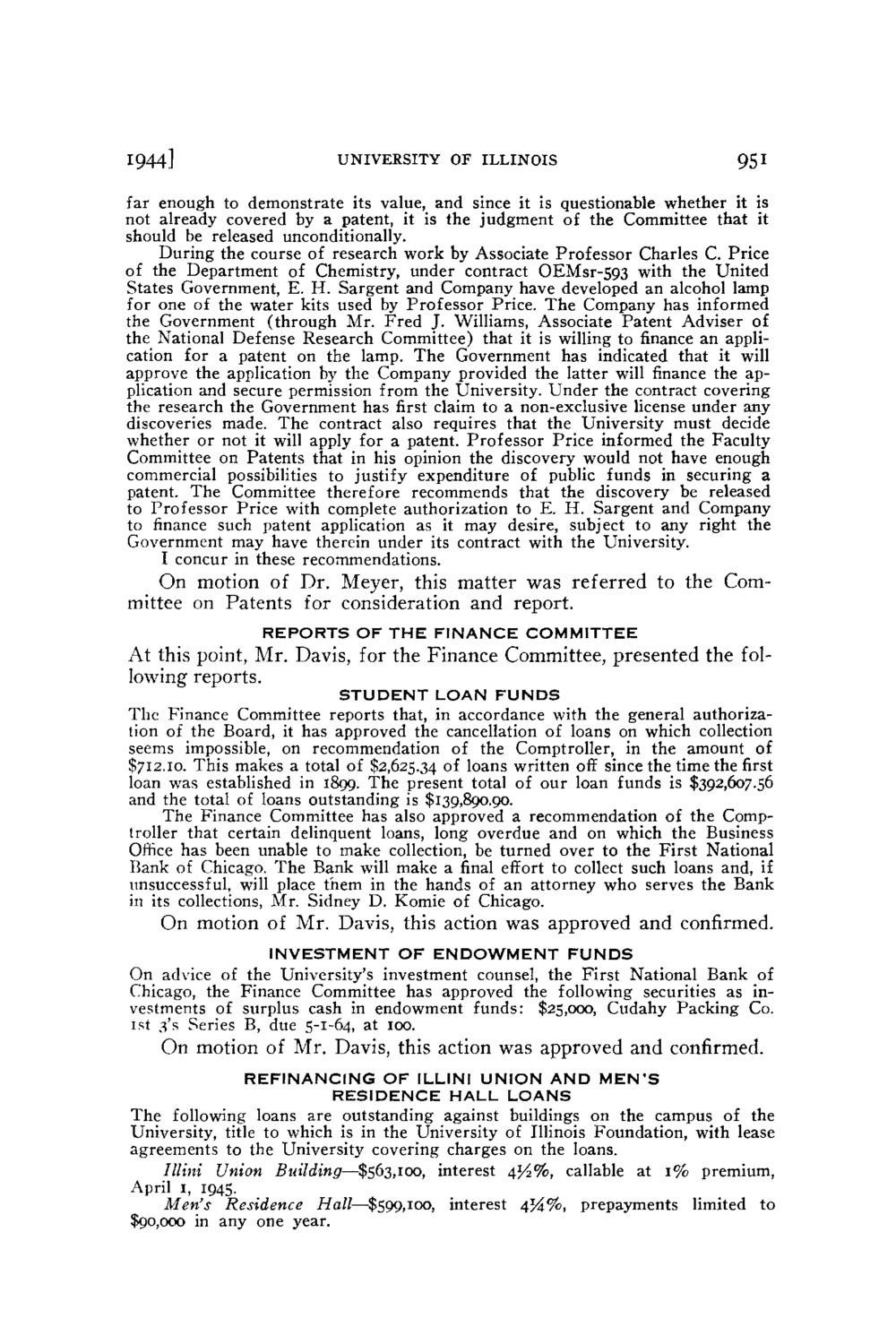| |
| |
Caption: Board of Trustees Minutes - 1944
This is a reduced-resolution page image for fast online browsing.

EXTRACTED TEXT FROM PAGE:
1944] UNIVERSITY OF ILLINOIS 951 far enough to demonstrate its value, and since it is questionable whether it is not already covered by a patent, it is the judgment of the Committee that it should be released unconditionally. During the course of research work by Associate Professor Charles C. Price of the Department of Chemistry, under contract OEMsr-593 with the United States Government, E. H . Sargent and Company have developed an alcohol lamp for one of the water kits used by Professor Price. The Company has informed the Government (through Mr. Fred J. Williams, Associate Patent Adviser of the National Defense Research Committee) that it is willing to finance an application for a patent on the lamp. The Government has indicated that it will approve the application by the Company provided the latter will finance the application and secure permission from the University. Under the contract covering the research the Government has first claim to a non-exclusive license under any discoveries made. The contract also requires that the University must decide whether or not it will apply for a patent. Professor Price informed the Faculty Committee on Patents that in his opinion the discovery would not have enough commercial possibilities to justify expenditure of public funds in securing a patent. The Committee therefore recommends that the discovery be released to Professor Price with complete authorization to E. H . Sargent and Company to finance such patent application as it may desire, subject to any right the Government may have therein under its contract with the University. I concur in these recommendations. On motion of Dr. Meyer, this matter was referred to the Committee on Patents for consideration and report. REPORTS OF THE FINANCE COMMITTEE At this point, Mr. Davis, for the Finance Committee, presented the following reports. STUDENT LOAN FUNDS The Finance Committee reports that, in accordance with the general authorization of the Board, it has approved the cancellation of loans on which collection seems impossible, on recommendation of the Comptroller, in the amount of $712.10. This makes a total of $2,625.34 of loans written off since the time the first loan was established in 1899. The present total of our loan funds is $392,607.56 and the total of loans outstanding is $139,890.90. The Finance Committee has also approved a recommendation of the Comptroller that certain delinquent loans, long overdue and on which the Business Office has been unable to make collection, be turned over to the First National Bank of Chicago. T h e Bank will make a final effort to collect such loans and, if unsuccessful, will place them in the hands of an attorney who serves the Bank in its collections, Mr. Sidney D. Komie of Chicago. On motion of Mr. Davis, this action was approved and confirmed. On advice of Chicago, the vestments of 1st 3's Series INVESTMENT OF ENDOWMENT FUNDS the University's investment counsel, the First National Bank of Finance Committee has approved the following securities as insurplus cash in endowment funds: $25,000, Cudahy Packing Co. B, due 5-1-64, at 100. On motion of Mr. Davis, this action was approved and confirmed. REFINANCING OF ILLINI U N I O N AND MEN'S RESIDENCE HALL LOANS The following loans are outstanding against buildings on the campus of the University, title to which is in the University of Illinois Foundation, with lease agreements to the University covering charges on the loans. Illini Union Building—$563,100, interest 4^2%, callable at 1% premium, April 1, 1945. Men's Residence Hall—$599,100, interest 4%%, prepayments limited to $90,000 in any one year.
| |